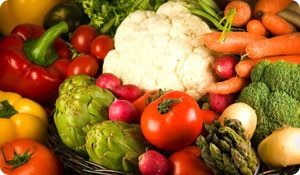
A diet rich in fruits and vegetables is key to good health. Now, women have more reason than ever to make sure they get their daily five servings. Folate-rich diets have been linked to a decreased risk of colorectal cancers.
Citrus fruits, peas, beans and leafy green vegetables are all high in folate; a water-soluble B Vitamin that plays a key role in copying DNA. A study in South Korea found that women who consumed the most folate in their diets had about two-thirds lower risk of developing colorectal cancer than women who consumed the least amount. Unfortunately, folate consumption didn't seem to have the same cancer prevention affect on men.
Researchers noted a significant increase in deaths from colorectal cancer (greater than six-fold) in South Korea since the early 1980s. They suspect it may be due to more people consuming Western-style diets that include fewer fruits and vegetables than traditional Korean diets. They compared diets of colorectal cancer patients and healthy individuals of the same age and gender and found that cancer patients drank and smoked more, were less active and also had a higher familial incidence of the disease. Even after taking these factors into consideration though, researchers found that women with high folate consumption (over 300 micrograms a day) were 64 percent less likely to develop colorectal cancer than women with the lowest folate consumption.
Eating folate-rich foods or taking folic acid supplements (the synthetic version of folate found in vitamins and fortified foods like breads and cereals) has always been especially important for women of childbearing age. Pregnant women with folate deficiency are at increased risk of delivering a baby with spina bifida or other neural tube birth defects. That's why women considering a pregnancy are encouraged to take folic acid supplements well in advance of conception. It now appears there may be reason to consume a folate-rich diet beyond the childbearing years.
How do you know you're getting enough folate? The U.S. Department of Health and Human Services, Office on Women's Health says most non-pregnant women need 400 micrograms (mcg) of folate each day. Pregnant women should aim for 600 mcg. The National Institute of offers a complete table of folate-rich foods including micrograms per serving. When in doubt about whether you're getting enough, consider taking a multivitamin that contains folic acid.
http://www.reuters.com/article/healthNews/idUSTRE58N4Q020090924





